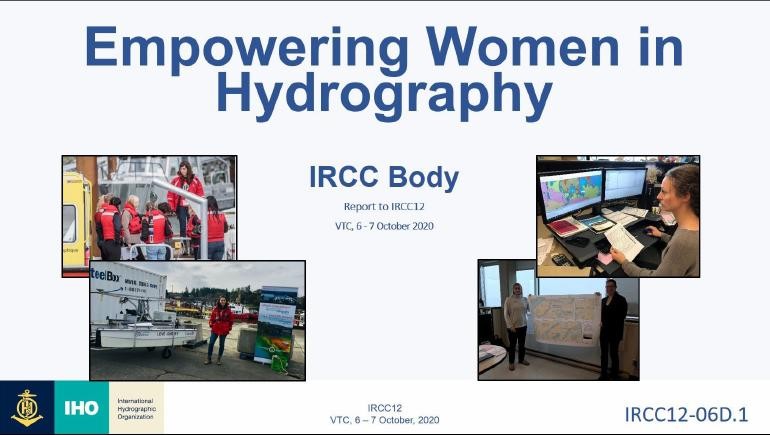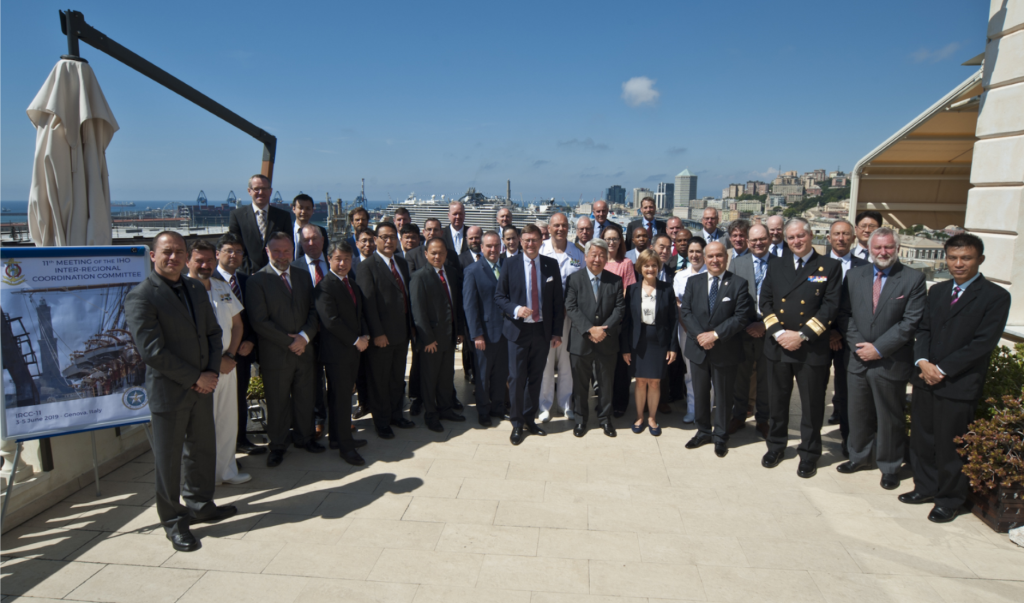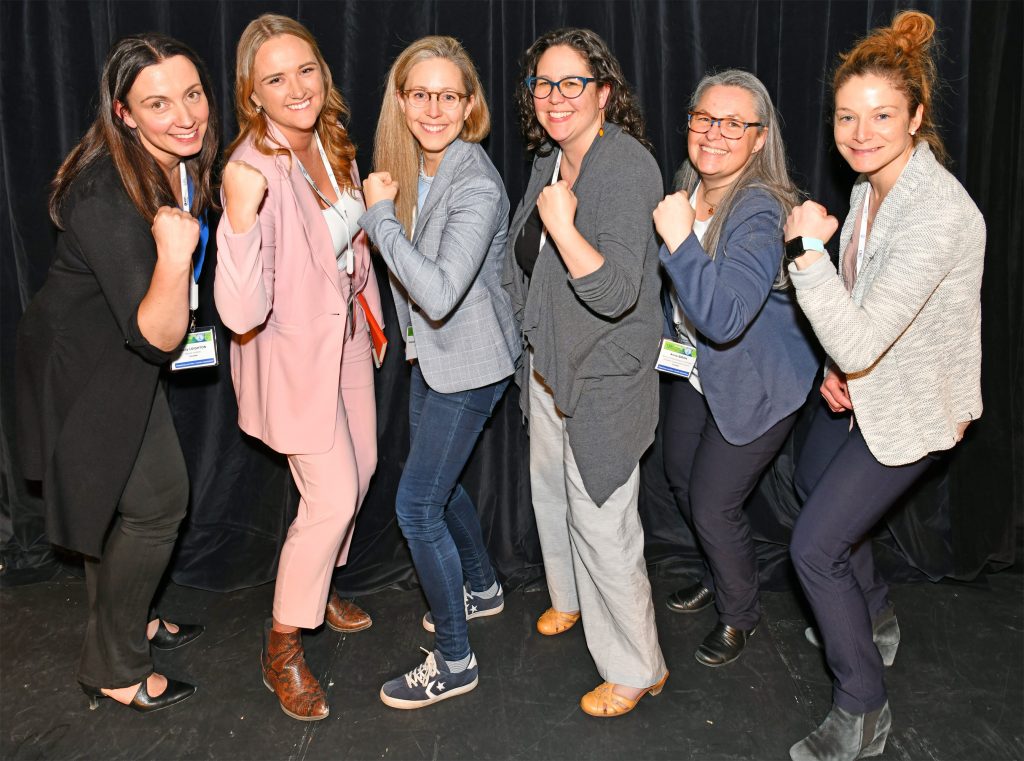In October 2020, the main author had the great pleasure to present at the International Hydrographic Organization Inter-Regional Coordination Committee (IRCC-12) virtual meeting, on behalf of Canada and IHO, an inspiring project proposal entitled “Empowering Women in Hydrography”. This project proposal was then approved by the virtual IHO Assembly in November 2020 (Decision C4/16) and will be integrated under the Capacity Building Sub-Committee (CBSC) work plan.

at the IHO Assembly 2 in November 2020.
The goal of this project is to initiate, organize and track a series of engagement activities which will enable more women to participate for diversity, equity and inclusiveness in the field of hydrography and to assume more leadership, senior and executives roles and positions within the hydrographic community.
Currently, there is a large gender imbalance in the participation of women, compared to men, in Science, Technology, Engineering, Mathematics (STEM) and maritime-related domains such as hydrography, at all levels but particularly at the more advanced career echelons and in related to senior and executive management as well as in policy-making processes. Gender diversity, equity and inclusiveness are key elements in unlocking a lot of potential, not only for the women themselves, but for their organizations. Many maritime-related organizations have started this change in narrative and symposiums, programs and activities have been held in the last years in relation with this theme.

As an example, at the Canadian Hydrographic Conference in February 2020 (CHC2020), dedicated networking activities as well as a special session entitled «Leadership feminine style!» were part of the official program. This session, chaired by Shelly Leighton (Advanced Access Engineering, Memorial University of Newfoundland), aimed at promoting female role models from hydrographic organisations, and inspiring women to take action on their career and seek opportunities. Vanessa Rochester, president of Women’s International Shipping & Trading Association Canada (WISTA Canada), opened the session with a presentation on «unconscious bias», highlighting how bias, conscious or not, is a disabler of diversity and leads to sameness of thinking. This was followed by a panel of three female leaders from the hydrographic industry, Marie-Eve Biron (Ocean Group), Karen Cove (Teledyne Caris) and Breanna Careen (Fugro) who shared their achievements, challenges, experiences and answered questions from the public.

Annie Biron (CHS, session organizer), Marie-Eve Biron (Ocean Group). Session organizers missing from the picture: Elizabeth Bonner (CHS) and Kathleen Mildon (TerraSond)
As part of the United Nations Decade of Ocean Sciences for Sustainable Development (2021–2030), Canada has a special grant and contribution fund to which the IHO has applied for 3 years. This fund will allow funding some activities to “promote gender equality in ocean science to aim at building a cohort of female leaders in the marine and oceanographic community”. This is a unique opportunity for the IHO and the international hydrographic community to show leadership and take concrete actions and results to forge links between two of the UN sustainable development goals: #14-life underwater, and #5-gender equality. This is a first step with initial seed money to launch a project to which IHO is hopeful that other member states will actively participate and want to contribute in-cash or in-kind above and beyond this funding. As an example, the National Oceanic and Atmospheric Administration (NOAA) Office of Coast Survey (OCS) has tentatively offered to host up to three female candidates each year of the project.
As we recognize that women are equally capable as men, we need to build awareness, expose and address systemic issues within the field of hydrography, which often limit women’s opportunities to develop and demonstrate their competencies and capabilities to the same extent as their male colleagues. We need to encourage organizations to take concrete actions in removing barriers for women, increase awareness on the benefit of having gender-diverse teams at all levels, and increase representation of women at higher echelons, as subject matter experts, managers, senior managers, executives and in the policy-making process.
The activities supported by this new project may evolve based on experience, opportunities, risks and clarification of desired outcomes. They could include, amongst others:
– A first virtual workshop (Spring 2021) to present and discuss the proposals and business plan, develop and adopt a vision, mission and objectives as well as subsequent workshops which would allow participants to present and report on the identified project’s progress. These subsequent workshops could be virtual or held in conjunction with other IHO working group, committee or subcommittee meetings;
– Internships at the IHO Secretariat or at hydrographic offices to work on targeted tasks, or increase operational knowledge and experience;
– Support for greater participation of women in IHO workshops, working groups, committees or subcommittees or at specialised events;
– Virtual professional workshops on specialized topics to promote female role models;
– Partnering up with other events related to gender equality in ocean science or the maritime community (e.g., IMO, …).
During this decade of ocean science, together, let us set the example and see how we can collectively change the face of hydrography and empower women to take on greater decision-making roles and responsibilities in the field of hydrography!
Capacity Building (CB) is one of the strategic pillars of the International Hydrographic Organization. Through our network of regional capacity building coordinators, we aim to assess the status of cartography and hydrography in the many IHO member states and see how we best can contribute to improve the situation. CB activities are funded through part of the IHO budget (coming from IHO member state contributions) and through the generous, annual contributions from the Republic of Korea and the Nippon Foundation in Japan. During the last decade, we have seen an annual increase in CB activities with a temporary setback in 2020 (and part of 2021) due to COVID-19 imposed restrictions. But there is always a need to do more than our budget allows us to. This is why all proposed activities are screened through a strict, transparent and fair evaluation and prioritization process so that we can select prioritized activities within the available budget.
Conclusion:
It is with great pleasure and gratitude that we, in the IHO community and especially within the CBSC, welcome the Canadian-led initiative to start a CB project on Empowering Women in Hydrography. One only has to look at the many group photos taken during any of the recent IHO working group or sub committee meetings to recognize the challenge this project aims to address. Well into the 21st century, hydrography and the hydrographic community are facing great new challenges. We have no doubt that addressing those challenges in groups and teams with a better gender balance will secure better and more long-term solutions. We would also like to thank the United States of America (USA) who has signalled early on that they are committed to contribute to the project and we hope many others will follow.
References:
– IRCC report to IHO Assembly 2 (October 2020) – see slide 6: https://iho.int/uploads/user/About%20IHO/Assembly/Assembly2/DOCUMENTS/A2_2020_G_05B_EN_IRCC_update_V1.pdf
– IHO Assembly 2 (November 2020)- Decision 35: https://iho.int/uploads/user/About%20IHO/Assembly/Assembly2/A-2_DECISIONS_EN.pdf
– 2021 GEBCO: Map the Gaps virtual Symposium (January 2021) – Panel Discussion on Diversity, Equity and Inclusiveness in Ocean Mapping – 1 hour 30 minutes: http://bit.ly/3oORXpS; and enter the password: A#d0e*6#